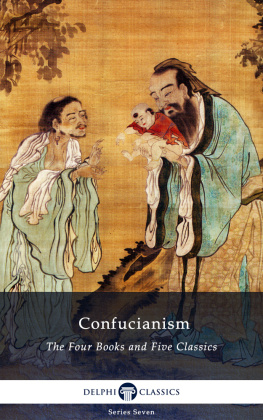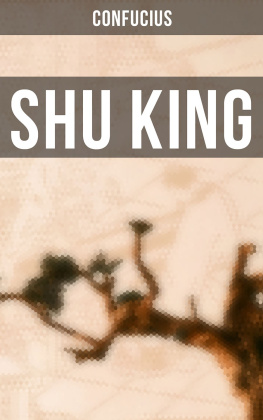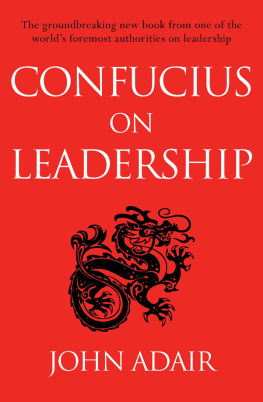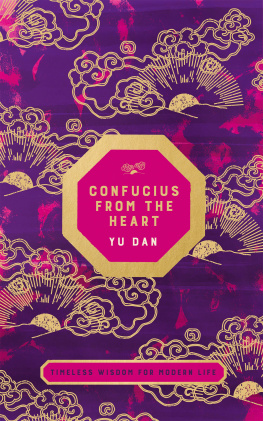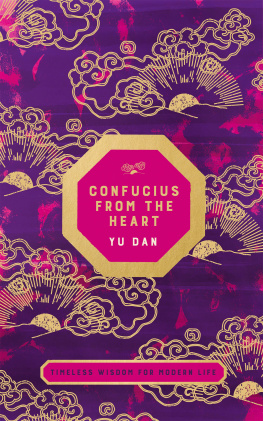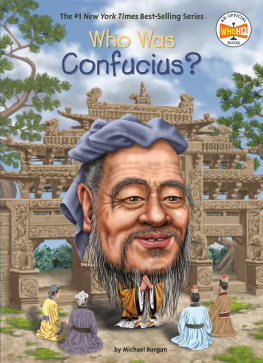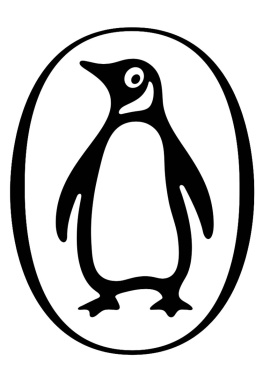Confucius - The Sayings of Confucius
Here you can read online Confucius - The Sayings of Confucius full text of the book (entire story) in english for free. Download pdf and epub, get meaning, cover and reviews about this ebook. genre: Science. Description of the work, (preface) as well as reviews are available. Best literature library LitArk.com created for fans of good reading and offers a wide selection of genres:
Romance novel
Science fiction
Adventure
Detective
Science
History
Home and family
Prose
Art
Politics
Computer
Non-fiction
Religion
Business
Children
Humor
Choose a favorite category and find really read worthwhile books. Enjoy immersion in the world of imagination, feel the emotions of the characters or learn something new for yourself, make an fascinating discovery.
The Sayings of Confucius: summary, description and annotation
We offer to read an annotation, description, summary or preface (depends on what the author of the book "The Sayings of Confucius" wrote himself). If you haven't found the necessary information about the book — write in the comments, we will try to find it.
The Sayings of Confucius — read online for free the complete book (whole text) full work
Below is the text of the book, divided by pages. System saving the place of the last page read, allows you to conveniently read the book "The Sayings of Confucius" online for free, without having to search again every time where you left off. Put a bookmark, and you can go to the page where you finished reading at any time.
Font size:
Interval:
Bookmark:
CONFUCIUS
| Page | |
| INTRODUCTION | vii |
| NOTE | xiv |
| THE SAYINGS OF CONFUCIUS | |
| BOOK I | |
| BOOK II | |
| BOOK III | |
| BOOK IV | |
| BOOK V | |
| BOOK VI | |
| BOOK VII | |
| BOOK VIII | |
| BOOK IX | |
| BOOK X | |
| BOOK XI | |
| BOOK XII | |
| BOOK XIII | |
| BOOK XIV | |
| BOOK XV | |
| BOOK XVI | |
| BOOK XVII | |
| BOOK XVIII | |
| BOOK XIX | |
| BOOK XX | |
| INDEX |
Confucius was born in the year 550 b.c. ,[1] in the land of Lu, in a small village, situated in the western part of the modern province of Shantung. His name was K'ung Ch'iu, and his style (corresponding to our Christian name) was Chung-ni. His countrymen speak of him as K'ung Fu-tzu, the Master, or philosopher K'ung. This expression was altered into Confucius by the Jesuit missionaries who first carried his fame to Europe.
Since the golden days of the Emperors Yao and Shun, the legendary founders of the Chinese Empire, nearly two thousand years had passed. Shun chose as his successor Y, who had been his chief minister, a man whose devotion to duty was such that when engaged in draining the empire of the great flooda task that took eight years to accomplishhe never entered his home till the work was done, although in the course of his labours he had thrice to pass his door. He founded the Hsia dynasty, which lasted till 1766 b.c. The last emperor of this line, a vile tyrant, was overthrown by T'ang, who became the first ruler of the house of Shang, or Yin. This dynasty again degenerated in course of time and came to an end in Chou, or Chou Hsin (1154-22 b.c. ), a monster of lust, extravagance, and cruelty. The empire was only held together by the strength and wisdom of the Duke of Chou, or King Wen, to give him his popular title, one of the greatest men in Chinese history. He controlled two-thirds of the empire; but, believing that the people were not yet ready for a change, he refrained from dethroning the emperor. In his day 'the husbandman paid one in nine; the pay of the officers was hereditary; men were questioned at barriers and at markets, but there were no tolls; fishgarths were not preserved; the children of criminals were sackless. The old and wifelessthe widower; the old and husbandlessthe widow; the old and childlessthe lone one; the young and fatherlessthe orphan; these four are the people most in need below heaven, and they have no one to whom to cry, so when King Wen reigned his love went out first to them' (Mencius, Book II, chapter 5). After his death, his son, King Wu, decided that the nation was ripe for change. He overcame Chou Hsin by force of arms, and, placing himself on the throne, became the founder of the Chou dynasty.
In the time of Confucius the Chou dynasty still filled the throne. But it had long since become effete, and all power had passed into the hands of the great vassals. The condition of China was much like that of Germany in the worst days of the Holy Roman Empire. The emperor was powerless, the various vassal states were independent in all but name, and often at war one with the other. These states again were disintegrated, and their rulers impotent against encroaching feudatories. In Confucius' native state, Lu, the duke was a mere shadow. The younger branches of his house had usurped all power. Three in number, they were called the Three Clans. The most important of the three was the Chi, or Chi-sun clan, whose chiefs Chi Huan and Chi K'ang are often mentioned by Confucius. But the power of the Chi, too, was ill-secured. The minister Yang Huo overawed his master, and once even threw him into prison. Nor was the condition of the other states of the empire better than that of Lu. Confucius thought it worse.
Into this turbulent world Confucius was born. Though his father was only a poor military officer, he could trace his descent from the imperial house of Yin. Confucius married at nineteen, and is known to have had one son and one daughter. Shortly after his marriage he entered the service of the state as keeper of the granary. A year later he was put in charge of the public fields. In 527 b.c. his mother died, and, in obedience to Chinese custom, he had to retire from public life. When the years of mourning were over, he did not again take office, but devoted himself instead to study and teaching. As the years rolled by his fame grew, and a band of pupils gathered round him. In 517 b.c. the anarchy in Lu reached such a pitch that Confucius moved to the neighbouring land of Ch'i. Here he had several interviews with the reigning duke, but met with little encouragement (xviii. 3). So he soon returned to his native country, and resumed for fifteen years his work as student and teacher.
During these fifteen years the power of the duke sank lower and lower, and the Chi was menaced by his minister Yang Huo. In times so dark, men that loved quiet sought in the world of thought an escape from the gloom around them, whilst others that were less resigned turned over in their minds the causes of the realm's decay. Lao-tzu, the founder of the mystic Taoist philosophy, taught that in inaction alone peace can be found; Mo-tzu proclaimed the doctrine of universal love: that we should love all men as we love self, love the parents of others as we love our own parents. Upright men were driven or fled from the world. Confucius often met them in his wanderings, and was reproved for not doing as they did. But his practical mind told him that inaction could not help the world, and that to find a remedy for the nation's ills, their cause must first be learned. This could only be done by historical study. He therefore devoted himself to the study of past times, edited in later life the Book of History, and compiled the work called Spring and Autumn, a history of his native state from 722 to 481 b.c. To bring again the golden days of Yao and Shun a return must be made to the principles of Wen and Wu, the kings that had rebuilt the empire after tyranny and selfishness had laid it low. Of impracticable ideals and renunciation of the world no good could come.
At last in 501 b.c. Yang Huo was forced to flee from Lu, and prospects brightened. A year later Confucius was appointed governor of a town. So great was his success as governor that before long he was promoted to be Superintendent of Works, and then to be Chief Criminal Judge. He won great influence with his master, and did much to lighten the general misery. He so strengthened the power of the duke that neighbouring states grew jealous. To sow dissension between duke and minister the men of Ch'i sent the duke a gift of singing girls. Such joy they gave him that for three days no court was held. On this Confucius left the land, 497 b.c.
For the next thirteen years Confucius wandered from land to land, followed by his disciples, seeking in vain for a ruler that was willing to employ him, and whom he was willing to serve. At times he was exposed to danger, at other times to want. But as a rule he was treated with consideration, although his teachings were ignored. Yet thirteen years of homeless wandering, of hopes deferred and frustrated, must have been hard to bear. When he left office Confucius was already fifty-three years old, and his life so far seemed a failure. The sense of his wasted powers may well have tempted him now and again to take office under an unworthy ruler; but knowing that no good could come of it he refrained, and probably he never seriously thought of doing so.
Font size:
Interval:
Bookmark:
Similar books «The Sayings of Confucius»
Look at similar books to The Sayings of Confucius. We have selected literature similar in name and meaning in the hope of providing readers with more options to find new, interesting, not yet read works.
Discussion, reviews of the book The Sayings of Confucius and just readers' own opinions. Leave your comments, write what you think about the work, its meaning or the main characters. Specify what exactly you liked and what you didn't like, and why you think so.


